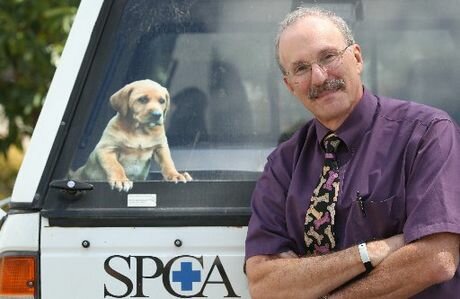Wisconsin has yet to enact a law that will allow courts to include pets in emergency protection orders for domestic violence victims. This statewide inability to intervene in the tangled web of abuse towards animals, children and other vulnerable populations is absolutely frustrating for those who are aware of the link between animal abuse and human violence.
While efforts have been attempted to persuade animal loving, family-minded legislators to listen and act upon the research presented by numerous animal welfare or domestic violence coalitions, legislative sessions come and go. No one takes up the cause.
Phil Arkow is the coordinator for the National Link Coalition, a national resource center on the Link between Animal Abuse and Human Violence, Chair of the Animal Abuse and Family Violence Prevention Project at The Latham Foundation, and consultant with the ASPCA and Animals and Society Institute. I recently approached him to gather more information on the LINK and resources that may help us in our quest to better protect our beloved pets and families at risk of violence in their homes. Phil works and resides in New Jersey. Our interview appears below.
1. Why the personal interest in the link between animal abuse and human violence?
After many years in the animal shelter and humane education fields, I began to realize that we were still spinning our wheels and hadn’t made as much progress as we should have, especially compared to other social welfare movements. The animal rights/animal welfare (no-kill/open admission) debates were driving a lethal wedge between the animal protection community.
I decided to focus my attention on two areas where I feel we have the greatest potential for traction with legislators, funders, the media, and the general public: animal assisted therapy and The Link. In both cases, these are situations where animals impact human health, welfare and safety. That’s a message the above audiences are ready and willing to accept – and the results have been dramatic. It’s a pragmatic approach, but it works. It’s what I call “Learn what the monster likes… and feed it.”
2. When did LINK research and the “movement” first surface here in the U.S.?
Although the concept that animal abuse predicts human violence dates at least as far back as the 13th Century, and was a popular motivation for SPCA and humane education efforts in the 19th Century, it began to come into its own as a research-based approach in the US in the 1980s.
3. Is the movement making progress?
It’s made tremendous progress. Much more needs to be done, of course, but we have made a lot of great gains.
4. What are some successes in terms of animal abuse and animal abuser legislation?
Twenty-three states have enacted laws allowing judges to include animals in domestic violence protection-from-abuse laws. Seven states define acts of animal abuse intended to intimidate a domestic partner as meeting the statutory definition of domestic violence – and one state does the same for elder abuse. Connecticut recently enacted a law mandating cross-training statewide between animal control officers and child protection workers.
5. Every state seems to take a different approach to animal cruelty laws. What would be ideal to you? For example, do you support a national database of animal abusers?
Animal abuser registries sound like a great idea but they are unenforceable, problematic, and not worth the effort everyone seems to be putting into them. A more effective approach is to get the FBI, which is currently updating its Uniform Crime Reporting system, to include animal cruelty as a distinct crime. It currently is not listed and consequently we have no data on the number of cases and the court dispositions. And without evidence-based practices we cannot accomplish much.
6. What do you hope to see accomplished in 2014?
We’d like to see South Dakota become the 50th state to make animal cruelty a felony. We’d like to see more states institute cross-reporting programs between child protection, animal care and control, and veterinarians.
7. Any other thoughts you’d like to share?
We have lots of training programs available and encourage dialogue. Visit our website at www.nationallinkcoalition.org. Our monthly e-newsletter – The LINK-Letter – is free. Just ask to be put on our mailing list.
Here is the February 2014 edition of the LINK 3-newsletter: http://nationallinkcoalition.org/wp-content/uploads/2014/02/LinkLetter-2014-February.pdf
Denice Ryan Martin, an advisor with Wisconsin Voters for Companion Animals, is a freelance writer and licensed social worker based in Genesee. She first wrote about this topic last May: "http://www.wivotersforcompanionanimals.com/1/post/2013/05/leave-no-pet-behind-why-wisconsin-needs-a-law-to-protectpetsfrom-domestic-violence.html" E-mail your thoughts to her at [email protected]


 RSS Feed
RSS Feed